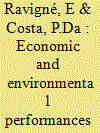| Srl | Item |
| 1 |
ID:
137653


|
|
|
|
|
| Summary/Abstract |
The Nigerian government proposed the use of compressed natural gas (CNG) as an automotive fuel in 1997 as part of the initiatives to harness natural gas (NG) resources but progress has been slow. This paper examines the natural gas vehicle (NGV) implementation approaches and outcomes in seven countries with diverse experiences in order to gain an understanding of the barriers to the NGV market development in Nigeria. The analysis employs hermeneutic principles to secondary data derived from academic literature, published reports from a variety of international agencies, grey literature, and text from online sources and identifies eight success factors for NGV market development namely: strategic intent, legal backing, learning and adaptation, assignment of responsibilities, financial incentives, NG pricing, consumer confidence, and NG infrastructure. The paper concludes that the principal impediment to NGV market development in Nigeria is the uncoordinated implementation approach and that greater government involvement is required in setting strategic goals, developing the legal and regulatory frameworks, setting of clear standards for vehicles and refuelling stations as well as assigning responsibilities to specific agencies. Short-term low cost policy interventions identified include widening the existing NG and gasoline price gap and offering limited support for refuelling and retrofitting facilities.
|
|
|
|
|
|
|
|
|
|
|
|
|
|
|
|
| 2 |
ID:
177310


|
|
|
|
|
| Summary/Abstract |
Road transport is a major CO2 emitter that can be reduced by using alternative fuels. This paper offers a micro-simulation of the adoption of compressed natural gas in heavy-duty vehicles based on real French data on industrial flows in 2018 from the automotive manufacturer Renault. Our purpose is to assess the potential of natural gas as a transition fuel for the supply chain by determining the economic conditions under which natural gas is both economically and environmentally beneficial.
|
|
|
|
|
|
|
|
|
|
|
|
|
|
|
|
| 3 |
ID:
150723


|
|
|
|
|
| Summary/Abstract |
Natural gas transportation fuels are credited in prior studies with greenhouse gas emissions savings relative to petroleum-based fuels and relative to the total emissions of biofuels. These analyses, however, overlook a source of potentially large indirect emissions from natural gas transportation fuels, namely the emissions from incremental coal-fired generation caused by price-induced substitutions away from natural-gas-fired electricity generation. Because coal-fired generation emits substantially more greenhouse gases and criteria air pollutants than natural-gas-fired generation, this indirect coal-use change effect diminishes potential emissions savings from natural gas transportation fuels. Estimates from a parameterized multi-market model suggest the indirect coal-use change effect rivals in magnitude the indirect land-use change effect of biofuels and renders natural gas fuels as carbon intensive as petroleum fuels.
|
|
|
|
|
|
|
|
|
|
|
|
|
|
|
|